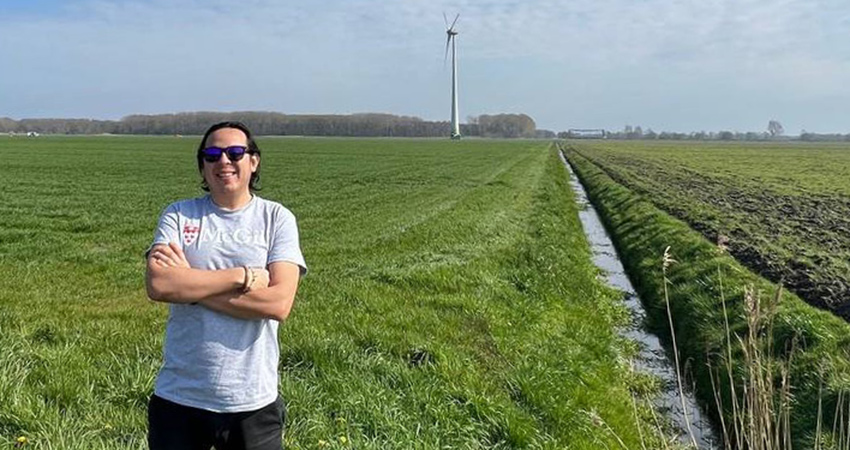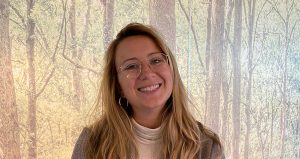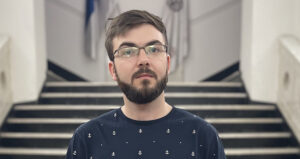Oscar: “Youth can play an important role in solving water challenges”

-
 Editorial Team
Editorial Team
Share article:
Oscar Alvarado is working as Senior Program Manager and Trainer at The Hague Academy for Local Governance. He joined the EJWP Special Bootcamp last January in Rotterdam, the Netherlands, in parallel with the EU Refreshing H2O Policy Workshop.“It gave me a chance to connect with other young water professionals. We were able to share insights, summarize the content of the workshop, and support each other during the sessions.”
What were memorable takeaways from the Bootcamp?
“It was great to learn about the experiences of the other participants. It was a diverse group representing many countries and organisations. I also think that the energizers led by the participants were great in injecting youthful energy to the workshop sessions!”
What value would you expect to bring to your organisation from external training-networking events like with EJWP?
“As a training organisation, we’re always looking for new materials and methodologies to help improve people’s skills. It was also nice to share our own content and expertise with a new group, and to get feedback from them. Hopefully there will be more opportunities to participate in EJWP events.”
What value would you expect to bring to your career, community and/or the sector?
“Creating, and maintaining, a strong network of like-minded professionals is certainly something that can help each other’s careers. The sector as a whole can also benefit from giving young water professionals a more visible platform to share their thoughts and experiences. I saw more attention being paid to youth engagement at the UN Water Conference in New York, and I think this is an area in which EJWP can contribute to developing for everyone to benefit.”
Do you have takeaways on young professionals’ participation in the recent 2023 UN Water Conference?
“For the first time at a high-level conference, young professionals were everywhere! They were in panels, leading sessions, giving presentations, and creating their own events. Almost every senior water professional I spoke with acknowledged the important role that youth can play in solving our water challenges. There is momentum for greater youth engagement in future conferences and projects.”
What do you think about young professionals looking toward COP28 this year? Can they really make a difference in projects and policy at this level?
“Yes, young professionals can make a difference but they need to speak in a coordinated way. Their presence has to be encouraged from the start in a meaningful way, not just ‘ticking a box’ and their views have to be backed up by solid evidence; this is where young researchers can come in. The role of young professionals is growing but it needs to be systematically integrated into the conference proceedings.”
Do you think it is important for professionals to develop soft-skill in the water-environmental-research sectors?
“Absolutely! Being a professional means more than just knowing the technical aspects of water or the environment. They need to be able to communicate, lead and share a vision with others. Some of these skills come more naturally to young professionals, like social media marketing, so they need to take advantage of this. Other skills, such as leadership, require training and coaching so that they can contribute to solutions in a productive way.”
What is a topic or area that you see as growing in importance or concern in the future?
“Nature-based and nature-inclusive solutions. It’s finally time to go beyond being sustainable and start regenerating nature in our societies. We have to reverse the trend of environmental degradation and biodiversity loss, which means incorporating nature in everything we do. This is where my passion lies and what I’ve been researching since my MSc thesis. The evidence is plentiful for the benefits of nature, so let’s implement natural solutions on a large scale in an inclusive manner.”
What would you change in policy or practice right now – on the national or European level?
“More meaningful consultations with local stakeholders. Make them feel that they are being listened to, consider their context-specific solutions, work on common ground. Too many people feel that top-down solutions are being implemented without due consideration, so this needs to change if we’re to achieve long-term sustainability where local stakeholders play a leading role. This also includes giving local governments the resources to implement (inter)national policies on the ground.“
What and where did you study?
“Master of Earth Sciences in Water Science and Management at Utrecht University / Master of Arts in Environmental Security and Peace at the UN University for Peace / Bachelor of Science in Biomedical Science at McGill University.”
Where would you like to be working in five years?
“Research consultant at an international organisation, where I can combine research, training and project implementation to promote nature-based solutions.”

















